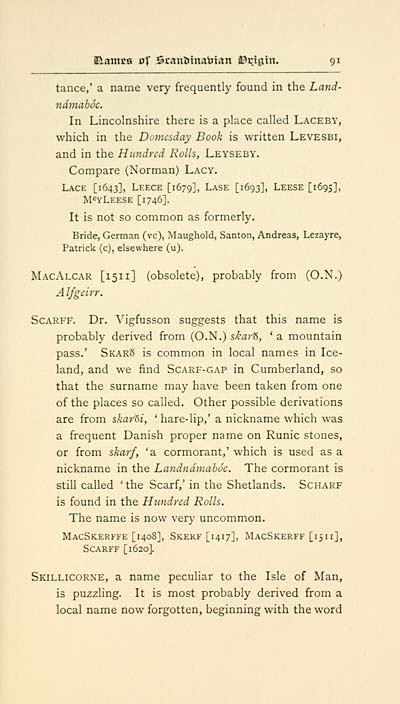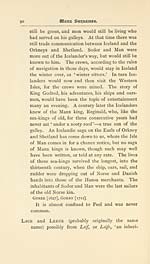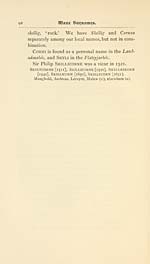Download files
Complete book:
Individual page:
Thumbnail gallery: Grid view | List view

WiemntB 0f ScaniiinatJian ©rti0in.
tance,' a name very frequently found in the Land-
ndmaboc.
In Lincolnshire there is a place called Laceby,
which in the Domesday Book is written Levesbi,
and in the Hundred Rolls, Leyseby.
Compare (Norman) Lacy.
Lace [1643], Leece [1679], Lase [1693], Leese [1695],
M<=yLeese [1746].
It is not so common as formerly.
Bride, German (vc), Maughold, Santon, Andreas, Lezayre,
Patrick (c), elsewhere (u).
MacAlcar [1511] (obsolete), probably from (O.N.)
Alfgcirr.
ScARFF. Dr. Vigfusson suggests that this name is
probably derived from (O.N.) skar'^, ' a mountain
pass.' SkarS is common in local names in Ice-
land, and we find Scarf-gap in Cumberland, so
that the surname may have been taken from one
of the places so called. Other possible derivations
are from skarhi, ' hare-lip,' a nickname which was
a frequent Danish proper name on Runic stones,
or from skarf, 'a cormorant,' which is used as a
nickname in the Landndmahoc. The cormorant is
still called 'the Scarf,' in the Shetlands. Scharf
is found in the Hundred Rolls.
The name is now very uncommon.
MacSkerffe [1408], Skerf [1417], MacSkerff [15 ii],
SCARFF [1620].
Skillicorne, a name peculiar to the Isle of Man,
is puzzling. It is most probably derived from a
local name now forgotten, beginning with the word
tance,' a name very frequently found in the Land-
ndmaboc.
In Lincolnshire there is a place called Laceby,
which in the Domesday Book is written Levesbi,
and in the Hundred Rolls, Leyseby.
Compare (Norman) Lacy.
Lace [1643], Leece [1679], Lase [1693], Leese [1695],
M<=yLeese [1746].
It is not so common as formerly.
Bride, German (vc), Maughold, Santon, Andreas, Lezayre,
Patrick (c), elsewhere (u).
MacAlcar [1511] (obsolete), probably from (O.N.)
Alfgcirr.
ScARFF. Dr. Vigfusson suggests that this name is
probably derived from (O.N.) skar'^, ' a mountain
pass.' SkarS is common in local names in Ice-
land, and we find Scarf-gap in Cumberland, so
that the surname may have been taken from one
of the places so called. Other possible derivations
are from skarhi, ' hare-lip,' a nickname which was
a frequent Danish proper name on Runic stones,
or from skarf, 'a cormorant,' which is used as a
nickname in the Landndmahoc. The cormorant is
still called 'the Scarf,' in the Shetlands. Scharf
is found in the Hundred Rolls.
The name is now very uncommon.
MacSkerffe [1408], Skerf [1417], MacSkerff [15 ii],
SCARFF [1620].
Skillicorne, a name peculiar to the Isle of Man,
is puzzling. It is most probably derived from a
local name now forgotten, beginning with the word
Set display mode to: Large image | Transcription
Images and transcriptions on this page, including medium image downloads, may be used under the Creative Commons Attribution 4.0 International Licence unless otherwise stated. ![]()
| Early Gaelic Book Collections > Blair Collection > Surnames & place-names of the Isle of Man > (109) |
|---|
| Permanent URL | https://digital.nls.uk/82100956 |
|---|
| Description | A selection of books from a collection of more than 500 titles, mostly on religious and literary topics. Also includes some material dealing with other Celtic languages and societies. Collection created towards the end of the 19th century by Lady Evelyn Stewart Murray. |
|---|
| Description | Selected items from five 'Special and Named Printed Collections'. Includes books in Gaelic and other Celtic languages, works about the Gaels, their languages, literature, culture and history. |
|---|

